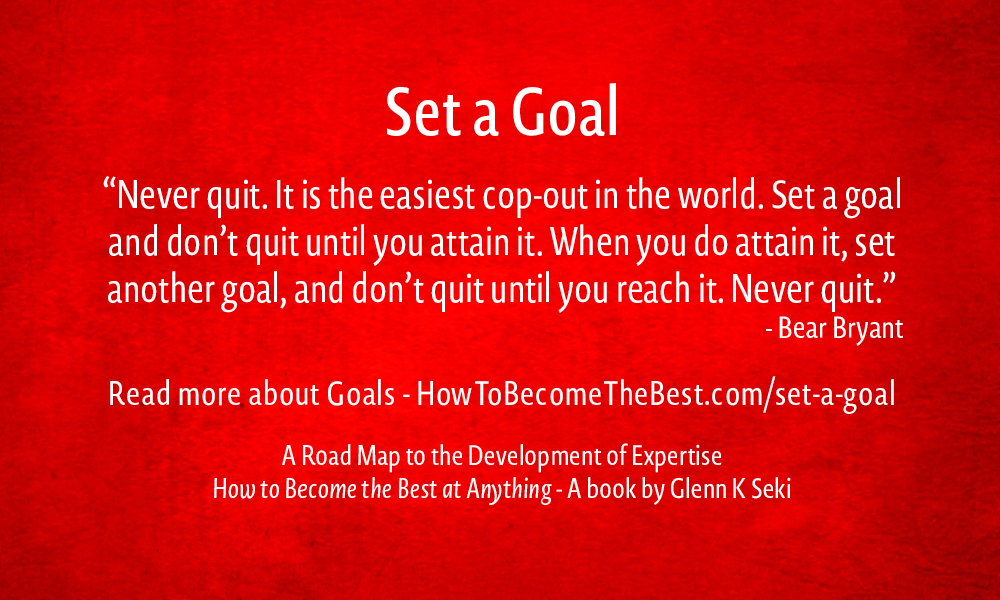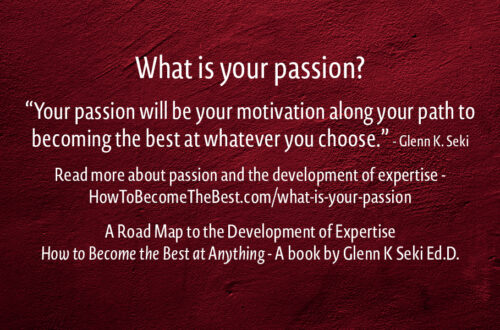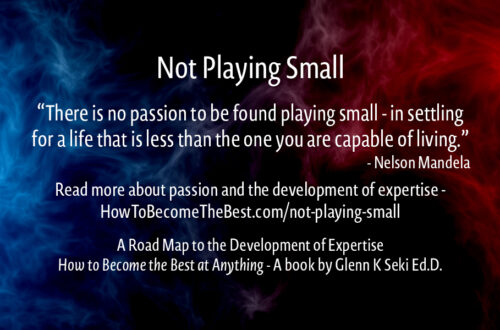“Never quit. It is the easiest cop-out in the world. Set a goal and don’t quit until you attain it. When you do attain it, set another goal, and don’t quit until you reach it. Never quit.” – Bear Bryant
Read below about Goals and Persistence –
An excerpt from How To Become The Best at Anything, Chapter 6, A Goal and a Plan
“You need to have a specific ultimate goal. Let’s say you want to win an Olympic gold medal in swimming in the 200-meter freestyle. You have a specific ultimate goal, which is a good start because you know your final destination.
When I was in graduate school in biology at UCLA one of my classes was a graduate seminar consisting of three students and two professors (George “Bart” Bartholomew and Thomas Howell, both top in their fields). One day in class the professors posed the question, “What does a migrating bird need to know to be able to find its way to winter nesting grounds?” All of us thought for awhile and I timidly answered, “They need to know where they are, and they need to know where they are going.” One professor said, “That is correct.” And I stopped shaking.
To navigate to anywhere you need to know your starting point and where you are going. Once you know that, you can determine the direction and the amount of time it will take you to reach your final destination. You will need a navigation system to guide you along your way. Let’s call this your path.”
Your Starting Point
“You must have a realistic evaluation of your starting point. What do you know? What don’t you know? What can you do? There are so many aspects to developing expertise in your chosen domain. How do you know what you know and what you don’t know? This is one of the reasons why you need a coach. More on coaches in the next chapter.
What is your starting point? You might be part way to your goal already. You might be very close to your ultimate goal and just need a little help to get to your final destination. You might know your starting point already. If not, you need to figure it out.
When I was 17 years old and a freshman in college, my grandfather brought a Canon FTb single lens reflex camera home from a trip to Japan. He gave the camera to my father, who gave it to me.
I always liked taking pictures with a brownie point-and-shoot camera as a kid, but that was it. Now I had this really cool camera. So, I went and bought a beginner’s book on photography and started from the beginning, with no real prior knowledge of photography.
What was my starting point? The very beginning.”
An excerpt from How To Become The Best at Anything, Chapter 9, Persistence, Motivation, and More About Your Path
Persistence
“Keep practicing no matter what. It will take years, you know this, so you have to keep practicing. You have to keep practicing getting better every time you practice. This is a very hard thing to do. You will get tired, bored, and frustrated. It is hard to keep your focus while practicing.
I heard a story about John Wooden (often considered one of the greatest college basketball coaches, ever) while I was a student at UCLA. During practice one of the basketball players was not practicing very hard. John Wooden pulled him aside and asked the player what was wrong. He was only working at 70%. He told his coach he was very tired and that he would give 200% at the next practice. Wooden said, one can only give 100% at any given time, so go out there and give me 100% today, tomorrow, and the next day. The player went out and gave 100% for the rest of practice. You have to give 100% every time you practice.
The motivation to keep practicing and to practice 100% of the time to get better is probably the key to becoming the best. This is probably the hardest thing to do. You have to be motivated for years and over 10,000 hours of practice.”





